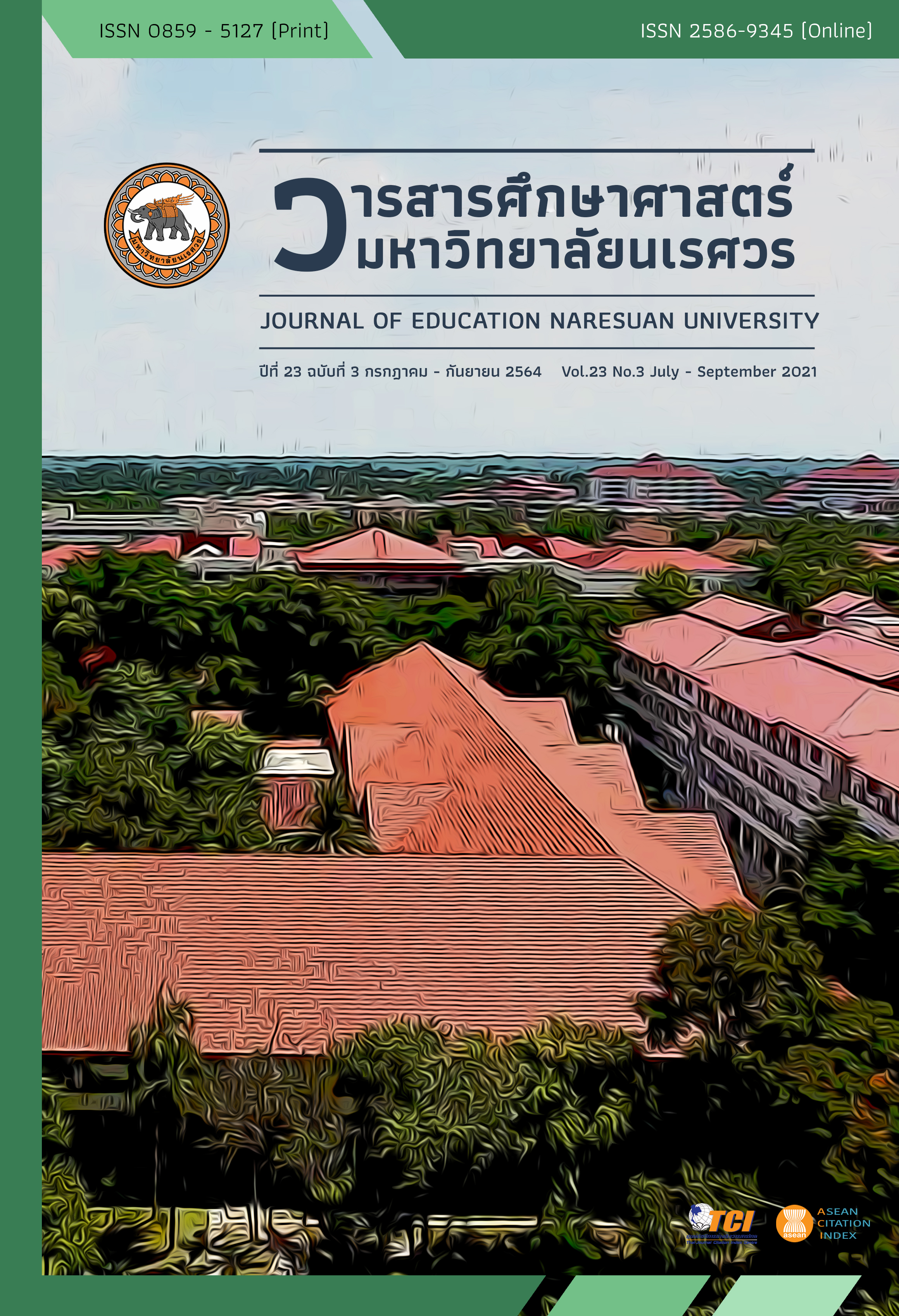THE EFFECTS OF USING THE 4MAT LEARNING ACTIVITIES IN THE TOPIC OF BODY SYSTEMS ON GRADE 8 STUDENTS’ ANALYTICAL THINKING AND ATTITUDE TOWARDS SCIENCES ผลการจัดกิจกรรมการเรียนรู้ตามวัฏจักรการเรียนรู้ 4 MAT เรื่อง ระบบร่างกายที่มีต่อความสามารถในการคิดวิเคราะห์และเจตคติต่อวิทยาศาสตร์ ของนักเรียนชั้นมัธยมศึกษาปีที่ 2
Main Article Content
Abstract
The purpose of this research was study the effects of using the 4MAT learning activities in the topic of body systems on grade 8 student’ analytical thinking and attitude towards.The participants were 29 students in grade 8 student of expansion school in Pattani province under the Office of Pattani Primary Education Service Area Office 1. The design of this research was quasi-experimental design. The data were collected by using learning achievement test, analytical thinking test and scientific attitude test, which the data were analyzed by t-test (One sample t-test and Paired sample t-test). The finding of this research showed that the learning achievement and analytical thinking post-test by teaching management through the 4MAT learning activities was higher than pre-test and higher than criterion with the statistical significance at .05., and finding that the scientific attitude post-test by teaching management through the 4MAT learning activities was higher than pre-test with the statistical significance at .05.
Article Details
The owner of the article does not copy or violate any of its copyright. If any copyright infringement occurs or prosecution, in any case, the Editorial Board is not involved in all the rights to the owner of the article to be performed.
References
Billings, R. L. (2001). Assessment of learning cycle and inquiry based learning in high school physics education (Master thesis). East Lansing, MI: Michigan State University. https://doi.org/doi:10.25335/M5V40K71V
Hsieh, H. C. (2003). The effect of whole-brain instruction on student achievement, learning, motivation, and teamwork at a vocational high school in Taiwan (Unpublished doctoral dissertation). USA: Idaho State University.
Jackson, H. B. (1999). Teaching to a diversity of learning styles: Using 4MAT model in a block scheduled school (Unpublished doctoral dissertation). Pittsburgh, PA: The University of Pittsburgh.
Karukarach, S. (2008). The results of 4 MAT teaching technique on learning unit “Wave” science subject group for matthayomsuksa 4 students, Klaeng “Wittayasathaworn” School (Master thesis). Chonburi: Burapha University. [in Thai]
Ketukaenchan, P. (1997). Brain based learning. Bangkok: Faculty of Education, Srinakharinwirot University. [in Thai]
Khemmani, T. (2012). The teaching knowledge for effective learning process. Bangkok: Chulalongkorn University Printing. [in Thai]
Ministry of Education. (2008). The basic education core curriculum B.E. 2551 (A.D. 2008). Bangkok: The Agricultural Cooperative Federation of Thailand. [in Thai]
Ministry of Education. (2010). National Education Act B.E. 2542 (1999) and Amendment (Third National Education Act B.E.2553 (2010). Bangkok: Prime Minister’s Office. [in Thai]
Narawin, R. (2011). The effect of learning about heat energy in mattayomsuksa 1 (Master thesis). Maha Sarakham: Mahasarakham University. [in Thai]
National Institute of Educational Testing Service (Public Organization). (2015). Basic statistics of the results of national basic education test (O-NET), Mathayomsuksa 3, academic year 2558. Retrieved June 10, 2016, from http://www.newonetresult.niets.or.th [in Thai]
Phanomsri, S. (2007). Effect of 4 MAT instruction of science learning in grade 4 students (Master thesis). Nakhon Ratchasima: Nakhon Ratchasima Rajabhat University. [in Thai]
Rangabthuk, W. (1999). Learning and teaching learner-centered. Bangkok: Love and Love Press. [in Thai]
Saiprom, O. (2008). A study of the conceptualizing ability, learning achievement, and attitude in sciences using circle instruction learning 4 MAT of prathomsuksa 5 students (Master thesis). Songkhla: Thaksin University. [in Thai]
Saiyos, L., & Saiyos, A. (2000). The measurement techniques to learn (2nd ed.). Bangkok: Suweeriyasarn. [in Thai]
Sathiankhet, S. (2015). Effect of using learning activity package on force and motion of science learning through 4 MAT learning model for prathomsuksa 3 students (Master thesis). Chonburi: Burapha University. [in Thai]
Sridara, T. (2001). The attitudes towards science of secondary level student under the office of the District Education Council 10 (Master thesis). Maha Sarakham: Mahasarakham University. [in Thai]
Srisa-ard, B. (1992). The basic research (2nd ed.). Bangkok: Suweeriyasarn. [in Thai]
Suksawad, U. (2013). The effects of using science learning activities in heredity by 7E learning cycle mixed storyline teaching of mathayomsuksa 3 (Master thesis). Chonburi: Burapha University. [in Thai]
Susauraj, P. (2013). The development of ideas. Bangkok: 9119 Partnership Technical Printing. [in Thai]
Suthasinobol, K. (2002). 4 MAT a learning process to develop the human potential of the learner. Ratchaburi: Thammarak Printing. [in Thai]
Thaporn, P. (2011). Comparison of mathayomsuksa 1 students’ learning achievements and scientific problem solutions on thermal energy through 4 MAT learning activity versus teaching a quest following the IPST type (Master thesis). Nakhon Phanom: Nakhon Phanom University. [in Thai]
The Institute for the Promotion of Teaching Science and Technology (IPST). (2003). The substance of science based on the basic education core curriculum. Bangkok: Office of the Welfare Promotion Commission for Teachers and Education Personal Printing Ladphrao. [in Thai]
Tiathong, M., Thongpae, W., & Chanruang, P. (2014). Comparison of learning achievement on Buddhism principle study of prathomsuksa 6 students taught by 4 MAT and Yonisomanasikarn methods. Journal of Education Naresuan University, 16(2), 182-194. [in Thai]
Wongsasom, U. (2009). The Effects of the 4MAT Cycle Learning Activities on the body system topic for Mathayomsuksa II Students (Master thesis). Khon Kaen: Khon Kaen University. [in Thai]
Watson, G., & Glazer, Z. E. M. (1964). Watson – Glaser Critical Thinking Appraisal Manual. New York: Brace and World.


